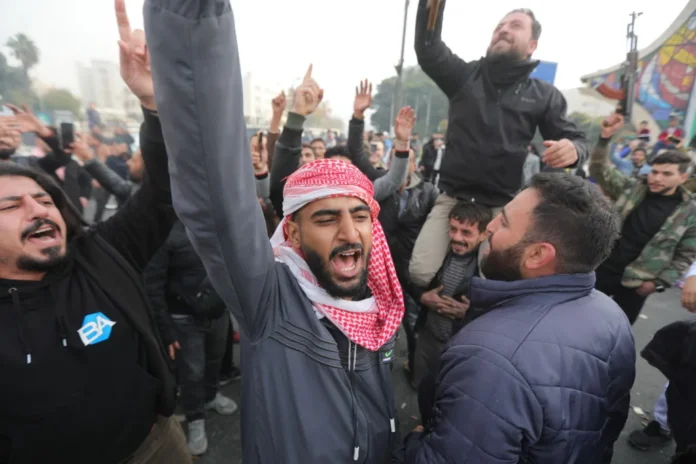DAMASCUS, Dec 9: Syrians woke up on Monday to a hopeful yet uncertain future after rebels seized the capital, Damascus, and President Bashar al-Assad fled to Russia, marking the end of a 13-year civil war and more than five decades of his family’s oppressive rule. The fall of Assad represents one of the biggest turning points for the Middle East in generations, as the lightning advance of a militia alliance led by Hayat al-Tahrir al-Sham (HTS), a former al-Qaeda affiliate, swept through the capital.
Assad’s ousting signifies a significant loss of influence for both Iran and Russia, who had used Syria as a stronghold to project power across the Arab world. Russian media reported that Moscow granted asylum to Assad and his family, a move confirmed by Mikhail Ulyanov, Russia’s ambassador to international organizations in Vienna, who stated on his Telegram channel that Russia had provided sanctuary.
Governments worldwide have expressed support for the end of Assad’s autocratic regime. U.S. President Joe Biden acknowledged that Syria now faces a period of risk and uncertainty, noting that it is the first time in years that neither Russia, Iran, nor Hezbollah holds significant sway in the country. Japan’s chief cabinet secretary, Yoshimasa Hayashi, emphasized that Tokyo is closely monitoring the situation.
Despite the fall of Assad, HTS remains a controversial entity, designated as a terrorist group by the U.S., Turkey, and the United Nations. However, the group has spent years trying to soften its image in an attempt to reassure international governments and Syria’s minority groups.
Assad’s departure limits Iran’s ability to supply weapons to its allies and could jeopardize Russia’s Mediterranean naval base in Tartus. This shift also raises hopes for the millions of Syrian refugees, many of whom have been living in camps across Turkey, Lebanon, and Jordan for over a decade, as they might now be able to return home.
A Monumental Challenge Ahead
The rebels now face the monumental task of rebuilding a country devastated by war. The civil war has left hundreds of thousands dead, cities reduced to rubble, and the economy decimated by global sanctions. Syria will require billions of dollars in international aid to begin its reconstruction.
Ahmed al-Sharaa, known as Abu Mohammed al-Golani, the head of HTS, spoke at a rally on Sunday at the Umayyad Mosque in Damascus, a site of great religious significance. He declared that Syria would become “a beacon for the Islamic nation” through hard work and unity.
Under the Assad regime, Syria was known for one of the harshest police states in the Middle East, with hundreds of thousands of political prisoners detained under horrific conditions. Following the fall of Assad, many prisoners were released, and jubilant reunions took place in the streets. Newly freed prisoners were seen running through Damascus, proudly showing their hands to indicate how many years they had spent in prison.
The White Helmets, a volunteer rescue group, has already deployed emergency teams to search for hidden underground prisons where more detainees may still be held.
With a curfew imposed by the rebel coalition, Damascus was calm overnight. Roads leading into the city were mostly empty, and a shopping mall had been looted. Some individuals were filmed ransacking Assad’s presidential palace, carrying off furniture.
The rebel coalition has stated that it is working to transfer power to a transitional governing body with executive powers. The goal is to establish a “Syria together,” involving all factions, including the country’s many religious and ethnic groups. While Golani is Sunni Muslim, Syria has a diverse religious population, including Christians and Alawites, a sect of Shi’ite Islam to which Assad belongs.
Global Reactions and Concerns
The rapid pace of events in Syria has taken the world by surprise, raising concerns about further instability in the region. This includes the ongoing Gaza war, Israel’s airstrikes on Lebanon, and escalating tensions between Israel and Iran.
U.S. Central Command reported conducting numerous airstrikes targeting Islamic State camps and operatives in central Syria. Secretary of Defense Lloyd Austin held talks with Turkish officials, urging the importance of protecting civilians as the situation continues to evolve.
The civil war in Syria, which began in 2011 as an uprising against Assad’s rule, led to the near-total destruction of cities, the displacement of millions of Syrians, and the largest refugee crisis in modern times. This crisis, particularly the influx of over a million refugees into Europe in 2015, triggered significant political challenges across Europe.
Throughout the conflict, Turkey supported rebel forces along its border and in a small enclave in the northwest. The United States, which still has approximately 900 troops in Syria, supported a Kurdish-led alliance that fought Islamic State jihadists from 2014 to 2017.
A New Chapter for Syria
As the Assad era comes to an end, Syria stands at a crossroads. The future remains uncertain, but with Assad’s departure, the country has entered a new phase of potential reconstruction, reconciliation, and challenges. The road ahead is fraught with uncertainty, but it is also filled with the possibility of rebuilding a nation that has suffered greatly over the past 13 years.

